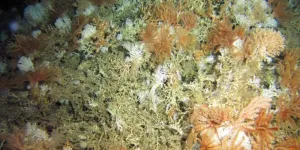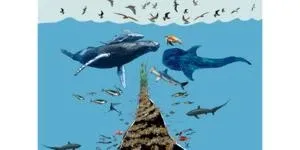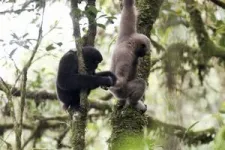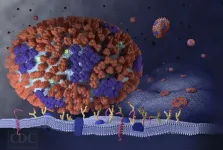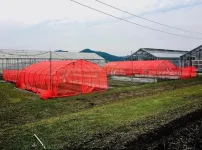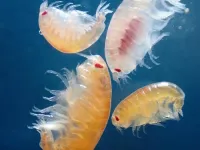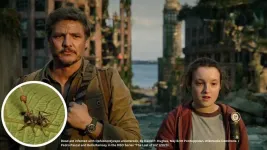(Press-News.org) Corals searching for food in the cold and dark waters of the deep sea are building higher and higher mountains to get closer to the source of their food. But in doing so, they may find themselves trapped when the climate changes. That is shown in the thesis that theoretical ecologist Anna van der Kaaden of NIOZ in Yerseke and the Copernicus Institute for Sustainable Development in Utrecht will defend on Feb. 20 at the University of Groningen. “When the water gets warmer, these creatures prefer to be deeper, but a coral doesn’t just walk down the mountain,” Van der Kaaden said.
Deep and dark
Unlike the famous, colorful tropical corals, cold-water corals live in dark waters a few hundred meters deep, for example off the west coast of Ireland. In the dark, they do not coexist with algae that often give tropical corals their spectacular colors; after all, those algae need light. “But that certainly does not mean that cold-water corals are boring,” Van der Kaaden emphasizes. “They sometimes have beautiful colors of their own. And they certainly play an equally important role in the ecosystem as tropical reefs. For example, they are oases of food for fish. They have a very central place in the ocean systems.”
Maze
Van der Kaaden conducted research on real reefs and on ‘mathematical reefs’ in computational models. “In both cases, I tried to discover the spatial patterns in which the corals grow. With the Australian Great Barrier Reef, for example, this is very simple: you can even see their growth patterns from space. With cold-water corals, you have to recognize these patterns while walking around in a pitch-dark maze, so to speak, with only a small flashlight. And yet, using statistical techniques and video stills, we did manage to get an overall picture," she notes. Her thesis describes, among other things, the regular reefs, ridges and mountains that corals form over thousands of years.
Higher than the Eiffel Tower
Van der Kaaden also saw how the corals, as true ‘ecosystem engineers’, adapted their environment, especially the water current, to attract more food particles to themselves. "Over hundreds of thousands of years, the coral reefs form mountains that can grow higher than the Eiffel Tower. So, the corals get higher in the ocean, where there is more food, and those mountains also create water currents that transport the food to the mountain."
Cold-blooded animal
The expectation is that if the water becomes too warm due to climate change, the corals will want to grow lower and colder. Van der Kaaden: "A cold-blooded animal like a coral uses up too much energy in warmer water. But a coral is an animal that is attached to the bottom, so it can't just move down the mountain. It disperses through larvae, but for new corals, the food conditions on the flanks of a coral mountain are worse because of the specific flow patterns."
Resilient
Van der Kaaden does not want to sound an immediate alarm about the survival of cold-water corals under the changing climate. "Maybe these organisms are more resilient than we think, and if not, they might build new mountains or reefs in other places. But with this research, I do want to show that an organism's response to climate change is not always easy to predict. There are many complex processes that create unexpected obstacles or opportunities. We, as a society must take that into account when preparing for the effects of climate change."
END
Cold-water coral traps itself on mountains in the deep sea
2024-02-14
ELSE PRESS RELEASES FROM THIS DATE:
Cost-effective to routinely change surgical gloves and instruments as well as being safer
2024-02-14
Surgeons who routinely change surgical gloves and instruments are incurring similar costs to those using the same equipment, a new study has found.
The economic evaluation funded by the UK’s National Institute for Health and Care Research (NIHR) follows a clinical trial conducted at 80 hospitals in Benin, Ghana, India, Mexico, Nigeria, Rwanda, and South Africa which established that routine change of gloves and instruments reduces surgical site infections (SSIs) by 13%.
The evaluation, published by the Lancet Global ...
Scientists discover hidden army of lung flu fighters
2024-02-14
Scientists have long thought of the fluid-filled sac around our lungs merely as a cushion from external damage. Turns out, it also houses potent virus-eating cells that rush into the lungs during flu infections.
Not to be confused with phages, which are viruses that infect bacteria, these cells are macrophages, immune cells produced in the body.
“The name macrophage means ‘big eater.’ They gobble up bacteria, viruses, cancer cells, and dying cells. Really, anything that looks foreign, they take it up and destroy it,” said UC Riverside virologist Juliet Morrison, who led the discovery team. “We were surprised to find them in the lungs ...
USC announces new Leonard D. Schaeffer Institute for Public Policy & Government Service
2024-02-14
USC, together with Leonard and his late wife Pamela Schaeffer, is launching a new institute with a $59 million gift from the Schaeffers to be anchored in Los Angeles and in the university’s new Capital Campus in Washington, D.C. The mission of the Leonard D. Schaeffer Institute for Public Policy & Government Service is to strengthen democracy by training generations of public leaders and advancing evidence-based research to shape policy that addresses the nation’s most pressing issues, USC President Carol Folt announced ...
Nearly 15% of Americans deny climate change is real, AI study finds
2024-02-14
ANN ARBOR—Using social media data and artificial intelligence in a comprehensive national assessment, a new University of Michigan study reveals that nearly 15% of Americans deny that climate change is real.
Scientists have long warned that a warming climate will cause communities around the globe to face increasing risks due to unprecedented levels of flooding, wildfires, heat stress, sea-level rise and more. Though the science is sound—even showing that human-induced, climate-related natural disasters are growing in frequency ...
Red nets signal “stop” to insect pests, reduce need for insecticides
2024-02-14
Red nets are better at keeping away a common agricultural insect pest than typical black or white nets, according to a new study. Researchers experimented with the effect of red, white, black and combination-colored nets on deterring onion thrips from eating Kujo leeks, also called Welsh onions. In both lab and field tests, red nets were significantly better at deterring the insect than other colors. Also, in field tests, onion crops which were either partially or fully covered by red netting required 25-50% less insecticide than was needed for a totally uncovered field. Changing agricultural nets from black or white to red could help reduce pesticide ...
AI tool predicts function of unknown proteins
2024-02-14
A new artificial intelligence (AI) tool that draws logical inferences about the function of unknown proteins promises to help scientists unravel the inner workings of the cell.
Developed by KAUST bioinformatics researcher Maxat Kulmanov and colleagues, the tool outperforms existing analytical methods for forecasting protein functions and is even able to analyze proteins with no clear matches in existing datasets[1].
The model, termed DeepGO-SE, takes advantage of large language models similar to those ...
Promising new therapeutic approach for treating metastatic pancreatic cancer
2024-02-14
A research paper published today (14 February 2024) in Nature Cancer details new insights into the role of efferocytosis – the burying of dead cells – in pancreatic cancer that spreads to the liver.
Liver metastasis occurs in 40–50% of people with pancreatic ductal adenosarcoma (PDAC), and there are currently no effective therapies to cure pancreatic cancer patients that have liver metastasis.
Led by University of Liverpool’s Professor Michael Schmid and colleagues, this study found PDAC metastases to show high levels of immunosuppressive macrophages, a type of white blood ...
Neuronal insights: flash and freeze-fracture
2024-02-14
Fear and addiction exert significant influence within society. Managing them is often challenging, as they are driven by intricate neuronal circuits in our brains. Understanding the underlying molecular mechanisms is crucial to intervene when these processes malfunction. Pioneered by scientists at the Institute of Science and Technology Austria (ISTA), the novel “Flash and Freeze-fracture” technique provides a unique glimpse into the respective brain region. The results were recently published in the journal PNAS.
While looking for food, a bird encounters a fox. It gets away just in time, but the sight ...
Tiny crustaceans discovered preying on live jellyfish during harsh Arctic night
2024-02-14
In the dark and cold of the months-long polar night, food resources are limited. Some groups of marine organisms in the polar regions overcome this challenge by going into a metabolic resting state in winter, surviving on reserves accumulated during the short growth season. But others, such as several species of marine zooplankton, have evolved a different strategy: they shift from a specialized to an omnivorous diet during the polar night, profiting from a wide range of potentially less rewarding foods that are available throughout the year.
Now, ...
It's award season: let's celebrate microbes in movies
2024-02-14
Elche (Spain), January 22, 2024. Usually, show business depicts viruses, bacteria, and other microorganisms as one of the worst menaces to humankind. Entertainment movies influence the way audiences understand and perceive these topics. Yet, few films accurately portray the science of microbiology and its social implications. Movies and TV series often feature outbreaks of deadly diseases and the efforts of scientists and medical professionals to contain them. However, entertainment movies can also educate the public about the importance and the impact ...
